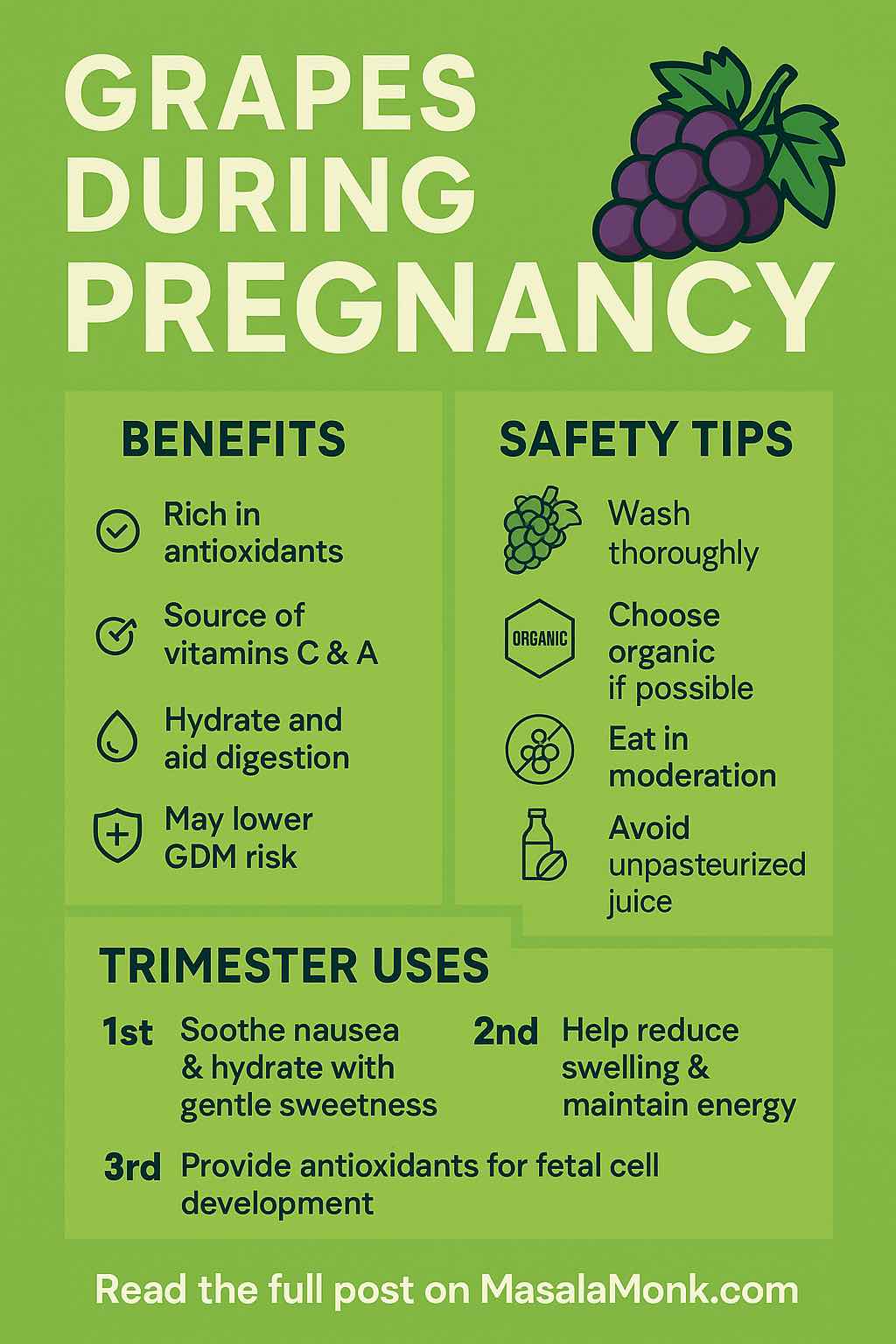
When pregnancy cravings strike, few snacks are as satisfying as a handful of cold, sweet grapes. They’re easy to pop in your mouth, require no peeling or chopping, and offer a refreshing burst of hydration. But are grapes just a tasty treat—or a nutritional powerhouse for moms-to-be?
Let’s explore the benefits, possible concerns, and trimester-by-trimester tips for enjoying grapes during pregnancy, with expert-backed insights and practical safety advice.
🍏 Are Grapes Safe During Pregnancy?
Yes—when washed thoroughly and eaten in moderation, grapes are a safe and healthy choice during pregnancy. They offer:
- Vitamin C → Boosts immunity and helps with iron absorption
- Vitamin A → Supports vision and organ development in your baby
- Potassium → Aids fluid balance and helps manage blood pressure
- Fiber & Water → Ease digestion and keep you hydrated
- Antioxidants (like resveratrol & flavonols) → May help protect against oxidative stress and certain complications
For a full overview of safe fruit choices during pregnancy, check our detailed guide:
Fruits During Pregnancy: Benefits, Myths, and Safe Choices
📊 What Does Research Say About Grapes in Pregnancy?
- Lower Risk of Gestational Diabetes (GDM)
A 2021 cohort study found that regular grape consumption during early pregnancy was linked to a lower risk of GDM. The protective effect is likely due to anthocyanins—especially in darker grape varieties. - Antioxidant Benefits for Mother & Baby
Grapes contain resveratrol, quercetin, and catechins—compounds that support cardiovascular health and may promote better fetal growth outcomes. - Hydration & Digestive Support
With ~80% water and 1g fiber per 10 grapes, they’re excellent for maintaining hydration and preventing constipation—a common pregnancy complaint.
For more on how nutrition impacts your baby’s development, read:
Nourishing the Mind: How Nutrition Affects Pregnancy Brain
🤰 Grapes in All Three Trimesters
| Trimester | Benefits of Grapes |
|---|---|
| First | Gentle sweetness helps ease nausea, hydration combats fatigue, vitamin C boosts early immune health |
| Second | Antioxidants support fetal cell development, potassium aids circulation, fiber helps digestion |
| Third | Hydration helps with swelling, potassium balances fluids, natural sugars give quick energy without spikes |
If first-trimester cravings are strong, check out:
Early Pregnancy Food Cravings: First Trimester Hunger Talks
🍇 Green vs. Red vs. Black Grapes — Which Should You Choose?
- Red & Black Grapes → Higher in antioxidants like resveratrol and anthocyanins
- Green Grapes → Slightly lower sugar, crisp and refreshing, great for light snacks
- All Grapes → Offer hydration, vitamins, and fiber
Balance is key—mixing colors can give you a wider range of nutrients.
For a deeper dive into grape-specific nutrition, visit:
Health Benefits of Grapes
🧃 Grape Juice vs. Whole Grapes
Whole grapes win—hands down—for fiber, satiety, and blood sugar control. If you enjoy grape juice:
- Choose pasteurized to avoid bacteria risks
- Limit to small servings to prevent sugar spikes
- Pair with protein (like nuts or cheese) for balanced energy
Learn more about food safety in:
Safe Eating During Pregnancy: Foods to Eat, Avoid, and Safety Practices
⚠️ Safety & Moderation Tips
- Wash thoroughly under running water to remove pesticide residues
- Choose organic when possible
- Avoid grape supplements or extracts—stick to the fruit itself
- Balance portions to avoid excess sugar intake
For anemia-friendly snack ideas that pair beautifully with grapes, try:
5 Iron-Rich Snack Ideas for Pregnant Women
🥗 How to Enjoy Grapes During Pregnancy
- Fresh in fruit salads with kiwi, apples, or berries
- Frozen grapes as a cooling summer treat
- Paired with nuts for a balanced snack
- Added to leafy greens like kale for an antioxidant-packed salad
(See: Kale During Pregnancy: Superfood for Supermoms)
✅ Key Takeaways
- Grapes are safe and nutritious for all trimesters when eaten in moderation
- Rich in antioxidants, vitamins, fiber, and hydration
- May help lower GDM risk and support fetal development
- Always wash well and avoid unpasteurized juice
- Variety in color means variety in benefits
💡 Bottom line: Grapes are more than a sweet pregnancy snack—they’re a nutrient-packed addition to your prenatal diet, easy to enjoy, and versatile in meals and snacks.
🍇 10 FAQs About Grapes During Pregnancy
1. Can I eat grapes while pregnant?
Yes. When washed thoroughly and eaten in moderation, grapes are safe in all trimesters and provide hydration, vitamins, and antioxidants.
2. Are grapes good for pregnancy?
Absolutely. Grapes offer vitamin C, potassium, fiber, and beneficial antioxidants that support both maternal health and fetal development.
3. Can pregnant women eat green grapes?
Yes. Green grapes are lower in sugar than some red or black varieties, making them a great choice for a refreshing, hydrating snack.
4. Which grapes are best for pregnancy—green, red, or black?
All are healthy, but red and black grapes have higher antioxidant levels, while green grapes are crisp, light, and slightly lower in sugar.
5. Are grapes safe in the first trimester?
Yes. They can help soothe morning sickness, hydrate, and provide vitamin C for early immune and tissue development.
6. Can I eat grapes in the third trimester?
Yes. Grapes can help reduce swelling (potassium), keep you hydrated, and give you natural energy for late-pregnancy fatigue.
7. Is grape juice safe during pregnancy?
Only if it’s pasteurized. Avoid unpasteurized grape juice due to the risk of harmful bacteria like Listeria and E. coli.
8. How many grapes can I eat per day when pregnant?
A moderate serving—about 1–2 cups per day—fits well into a balanced pregnancy diet without causing excess sugar intake.
9. Do grapes help with gestational diabetes?
While grapes contain natural sugars, their fiber and antioxidants can help support healthy blood sugar control. Portion control is important.
10. Should I peel grapes before eating them during pregnancy?
Not necessary if they’re washed well—the skin holds most of the antioxidants. Peel only if you’re sensitive to the texture or concerned about pesticide residues.









